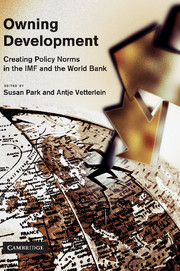Preface and acknowledgements
Published online by Cambridge University Press: 02 December 2010
Summary
Economics. Politics. Society. How do these three work together and in what order? Questioning the order in which societies organize is fundamental to understanding economic development and international political economy. International organizations such as the International Monetary Fund (IMF) and the World Bank are integral to how developing societies determine that ordering, by proffering development norms and sanctioning appropriate economic behaviour. This book takes a step back to look at how the Fund and the Bank take up the ideas they do and translate them into policies that are then propagated throughout the developing world. We did not know that we shared these concerns until we met in 2005. We both had the pleasure of attending a World Bank workshop organized by Diane Stone in Budapest. We didn't know each other then, but the workshop brought us together with a number of likeminded people who have contributed to this volume, people we now call friends.
The workshop was important for identifying researchers who had taken up the constructivist challenge identified by Michael Barnett and Martha Finnemore in 1999: to open the proverbial black box of international organizations (IOs) to see how and why they make the decisions they do. We view this edited collection as representative of a new generation of IO scholars who do just that. All of the people in this book examine how and why the IMF and the World Bank operate the way they do by tracing how ideas enter into these institutions and become policies that the Fund and the Bank promote to developing countries, which is a process that creates what we call ‘policy norms’.
- Type
- Chapter
- Information
- Owning DevelopmentCreating Policy Norms in the IMF and the World Bank, pp. xi - xivPublisher: Cambridge University PressPrint publication year: 2010

